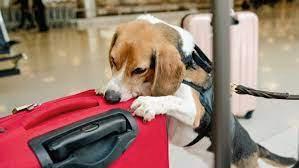Expense and Time to Train Food-Detection Beagles Justified by Value
 A recent news article provided details on the performance of the teams of U. S. Customs and Border Inspectors and their beagles at O’Hare International Airport in Chicago.
A recent news article provided details on the performance of the teams of U. S. Customs and Border Inspectors and their beagles at O’Hare International Airport in Chicago.
Previously, EGG-NEWS has flippantly noted that in contrast to avian influenza that is a risk for the poultry industry, the pork producers have some measure of protection in that “pigs do not fly”. In reality pork does fly, in the baggage of air travelers. Accordingly, the sensitive scent detection of dogs is required to screen both checked bags in handling areas and carry-on luggage in receiving areas for the presence of contraband plant products and meat.
According to the article, it takes approximately six months to train a suitable beagle to detect five odors comprising apples, citrus, mango, beef and pork. The final two months of the training period are with the handler to develop a team approach to detection. Less than half of available beagles screened by the National Detection Dog Training Facility in Newnan, GA have the temperament and ability to become detection dogs for agricultural products.

Although expensive to train and maintain, beagles and their larger counterparts screening checked bags perform a valuable service and are especially useful in detecting and excluding pork products. These currently represent a risk of introduction of African swine fever from Africa, Eastern Europe and the Caribbean. This has been demonstrated from confiscations of pork yielding ASF virus at Bangkok, Singapore and Taipei airports.
The National Pork Producers Council and other livestock associations have lobbied for more detector dogs, especially at major international airports given the volume of agricultural contraband routinely detected and confiscated. As a frequent traveler through Raleigh-Durham International Airport, my point of entry from Europe, I have yet to see a beagle detector dog. Airports without handler and dog teams base protection on a voluntary declaration as part of the customs process. Many of the passengers entering RDU on daily flights from Paris and London connect at these international hub airports from their points of origin in Asia and Africa where ASF and HPAI are endemic.
The U. S. livestock and poultry industries deserve more detector dogs at points of entry. Congress should allocate resources to increase the strength of the beagle brigade. Detection and interdiction are far less expensive than control and eradication of an exotic disease.